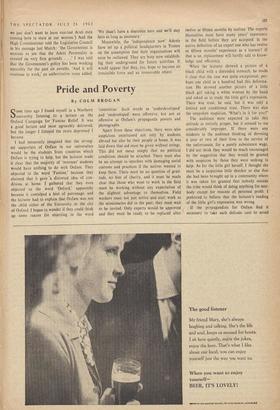Pride and Poverty
By COLM BROGAN
SOME time ago I found myself in a Northern university listening to a lecture on the Oxford Campaign for Famine Relief. It was a good lecture and most agreeably delivered, but the longer I listened the more depressed became.
I had innocently imagined that the strong- est supporters of Oxfam in our universities would be the students from countries which Oxfam is trying to help, but the lecturer made it clear that the majority of 'overseas' students would have nothing to do with Oxfam. They objected to the word 'Famine,' because they claimed that it gave 'a distorted idea of con- ditions at home. I gathered that they even objected to the word 'Oxford,' apparently because it contained a hint of patronage, and the lecturer had to explain that Oxfam was not the child either of the University or the city of Oxford. I began to wonder if they could think up some reason for objecting to the word 'committee.' Such words as 'underdeveloped' and 'undeveloped' were offensive, but not so offensive as Oxfam's propaganda posters and photographs.
Apart from these objections, there were also suspicions entertained not only by students abroad but also by their people at home. It was laid down that aid must be given without strings. This did not mean simply that no political conditions should be attached. There must also be no attempt to interfere with damaging social customs and practices if the natives wanted to keep them. There must be no question of grati- tude, no hint of charity, and it must be made clear that those who went to work in the field must be working without any expectation of the slightest advantage to themselves. Field workers must not just arrive and start work as the missionaries did in the past; they must wait to be invited. Only experts would be approved and they must be ready to be replaced after twelve or fifteen months by natives. The experts themselves must have many years' experience in the field before they are accepted. Is the native definition of an expert one who has twelve or fifteen months' experience as a learner? If that is so, replacement will hardly add to know- ledge and efficiency.
When the lecturer showed a picture of a black child with a distended stomach, he made it clear that the case was quite exceptional; per- haps one child in a hundred had this deforma- tion. He showed another picture of a little black girl taking a white woman by the hand and asked us to study the little girl's expression. There was trust, he said, but it was only a limited and conditional trust. There was also the unspoken suspicion, 'What's in it for you?'
The audience were expected to take this attitude as entirely proper, but it seemed to me considerably improper. If there were any students in the audience thinking of devoting a year or two of their lives to the service of the unfortunate, for a purely subsistence wage, I did not think they would be much encouraged by the suggestion that they would be greeted with suspicion by those they were seeking to help. As for the little girl herself, I thought she must be a suspicious little shocker or else that she had been brought up in a community where it was taken for granted that nobody outside the tribe would think of doing anything for any- body except for reasons of personal profit. I preferred to believe that the lecturer's reading of the little girl's expression was wrong.
If the propagandists for Oxfam find it necessary to take such delicate care to avoid hurting tender susceptibilities, their effectiveness must surely be diminished. People seeking to raise funds for a humanitarian purpose are most likely to be successful if they can stress the gravity of the need. and they are likely to be seriously handicapped if they are forced to play down the need. The aim of Oxfam, which is to help others to help themselves, could not be bettered, but if those who have the will to help must soothe all the suspicions of those who speak for the unfortunates who badly need the help, the Victorian position is reversed. It happened too often in Victorian times that those who administered charitable funds demanded proof that those seeking charity belonged to the respectable poor and not to the disreputable poor. Does a nervous social conscience now drive us to prove that we belong to the respect- able rich? Have the donors and not the sup- liants now to offer their credentials? Even in the buffle-headed West with its hypochondriac conscience, I cannot believe that this attitude will long continue.
For all I know, there may be an element of exaggeration in Oxfam's propaganda, but there was also an element of exaggeration in the propaganda of our nineteenth-century reformers, and those who hoped to gain by the reforms proposed never dreamt of objecting. They wanted the reforms.
I find it unplcasing that students sent here at a cost their countries can ill afford should be so sensitive to outward opinion and so in- sensitive to the dire need of diseased and hungry children at home. Touchy vanity is not an agree- able personal characteristic, and it is no more agreeable when it is collective. It is damaging both to the person and to the collectivity.
It may be understandable that people who have just escaped from the humiliations of colonialism should be prickly and suspicious. We who have not made a parallel escape ought to make generous allowances, but the allow- ances should not be inexhaustible. The leaders of emergent nations should be privately told that we will not underwrite their inferiority complex with an open cheque. After all, we don't needtto supply them with money and with skilled experts. If a country stands badly in need of the most primitive medical care and the most primitive agricultural instruction, there is no reason why we should pay out money to build a strip mill in a country which has hardly discovered the wheel and to provide a national airline, the most fatuous of all status symbols. The planes are not national, the crews are not national, the ground staff is not national, the equipment is not national and the loss in opera- tion is not met by the nation.
'Aid without strings' was Harold Skimpolc's pleasant dream, but the most patient of his friends woke him up from time to time. There is only one word for aid that is genuinely with- out strings and that word is blackmail. If we admit that our aid should be given uncondition- ally because it is only a belated and partial restitution of what we stole in the past, then we concede the whole Communist case on colonialism. On the other hand, if we say that we should try to feed the hungry, cure the giliwased and train the unskilled, then we have not only a right but a duty to see that the money we give is wisely spent and that the knowledge of our expert advisers is used to the full. This is a duty that we owe the humble people of the nations we are seeking to help, for foreign aid misapplied can do as much harm as good. For this reason alone, we should reject the demand that all foreign aid should be 'chan- nelled' through the United Nations. This device would enable fly-whisking politicians to take the money, ask for more, and remain officially ignorant of where the money came from. If we take, on responsibility for helping the helpless we must not sign that responsibility away along with a large cheque. If we take a more generous but at the same time a more realistic and tougher line on foreign aid, there will be loud cries of wounded dignity and accusation; of neo-colonialism.
Let it be so. Perhaps neo-colonialism is what the former colonies need. There is no re i,on to fear that our money will be flung back at us if we insist on having a look at the books. De Gaulle has shown that the strings will be gladly enough accepted so long as the desperately needed aid is forthcoming. Of course, the proud- spirited Asian and African leaders could turn their backs on us and ask for equivalent aid from Russia.
Well, they could try.







































 Previous page
Previous page